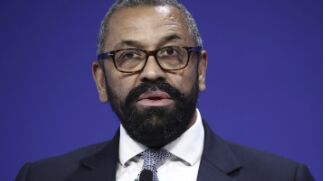UK Foreign Secretary James Cleverly to Make Historic Visit to China, Aims to Mend Ties Amidst Rising Tensions
Britain's foreign secretary, James Cleverly, is set to visit China to strengthen bilateral relations and address tensions. This marks the first visit by a UK foreign secretary to China in over five years. The visit will include discussions on various issues, such as civil liberties in Hong Kong and human rights abuses. Cleverly aims to urge China to fulfill international obligations and find common ground. However, there are differing opinions within the UK government on how to approach China, with some prioritizing trade ties. Cleverly's visit holds great importance in shaping the future of China-Britain relations.
In a significant diplomatic move, James Cleverly, Britain’s foreign secretary, is scheduled to visit China in an effort to strengthen bilateral relations and address the existing tensions between the two nations. This visit will mark the first time a UK foreign secretary has traveled to China in over five years, underscoring the importance of this trip and the desire to restore the deteriorating ties between the two countries. The Chinese Foreign Ministry announced that Cleverly's visit will include in-depth discussions on Sino-British relations as well as international and regional issues of mutual concern. It is hoped that this visit will promote the stable development of the relationship and uphold the spirit of mutual respect. Both sides aim to deepen exchanges, enhance mutual understanding, and find common ground on various important matters.
The current state of China-Britain relations is at its lowest level in decades, primarily due to disagreements on multiple issues. These include concerns over Beijing's infringement on civil liberties in Hong Kong, allegations of human rights abuses against the Uyghur minority in Xinjiang, China's support for Russia, and Britain's close security ties with the United States. Cleverly has expressed his intention to address these issues during his visit, emphasizing that with influence comes responsibility on the global stage. He plans to urge China to fulfill its international commitments and obligations, including efforts to end Russia’s invasion of Ukraine and reduce tensions in the South China Sea.
Nevertheless, the UK's governing Conservative party is divided over the approach to be taken in dealing with China. Some critics, including former Prime Minister Boris Johnson, have been accused of prioritizing trade ties and not adequately addressing Chinese threats to national security. The current Prime Minister, Rishi Sunak, aims to pursue a more nuanced and non-confrontational approach. While acknowledging China as a systemic challenge to Britain's values and interests, Sunak also emphasizes the need to maintain a productive relationship with the Asian superpower. However, this approach has not been without its critics. Conservative lawmaker Iain Duncan Smith, a vocal opponent of the Chinese Communist Party, has labeled Cleverly's visit as a demonstration of "Project Kowtow." He contends that the current position of prioritizing business interests over confronting China on human rights issues smacks of appeasement.
Duncan Smith himself is among the five British members of Parliament critical of Beijing who were sanctioned by China in 2021, further illustrating the complex dynamics and challenges surrounding the relationship. During his visit, Cleverly plans to request the lifting of sanctions imposed by China and explore potential areas of cooperation such as climate change and trade. This trip is aimed at strengthening communication channels and safeguarding British interests, as outlined by the Foreign Office. Cleverly is scheduled to meet with Chinese Foreign Minister Wang Yi and Vice President Han Zheng, providing an opportunity to engage directly on crucial matters.
Amnesty International UK's chief executive, Sacha Deshmukh, has called on Cleverly to ensure that human rights concerns are prioritized throughout his visit. Advocating for a proactive approach, Deshmukh urges the foreign secretary to go beyond raising human rights issues behind closed doors. Cleverly's trip to China was initially planned for July but was postponed, and his then-counterpart, Qin Gang, was replaced by experienced diplomat Wang Yi. As Cleverly embarks on this crucial journey, his mission is both to address the existing challenges in the Sino-British relationship and to explore avenues for cooperation and mutual understanding. With human rights and security concerns at the forefront, Cleverly's visit bears tremendous significance for shaping the future trajectory of China-Britain relations.




